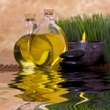
Essential oils are generally perceived to be safe, particularly when used topically or in aromatherapy. New research suggests that might not always be the case. Here’s what you should know.
Eucalyptus oil and camphor are very commonly used in aromatherapy. Both have a long history of use with few reports of safety concerns when used topically or by inhalation. But in a new multi-center observational study, researchers reported a potential link between seizures and the topical or inhaled use of these essential oils. People presenting with a seizure, including those with and without a history of seizures, were asked about recent use of essential oil. Over four years, researchers identified 55 cases of essential-oil related seizure – 40% were in people who’d never before had a seizure. Most seizures occurred 0.5 to 24 hours after topical application to the chest, neck, and face or 2-30 minutes after steam inhalation of camphor, eucalyptus, or a combination of both. After being treated for the initial seizure, the patients were told to discontinue using essential oils and were then monitored for 1-3 years. None of the patients without a history of seizures had another seizure, nor did 97% of those with a history of seizures.
While more research is needed to fully understand this link, it’s important to keep in mind. The essential oil market in the US is a multi-billion-dollar industry, and it’s not slowing down. There’s been concern about the safety of ingesting any essential oil for some time – even though some of the larger essential oil companies actually promote this – but using them topically or via inhalation has generally been considered safe. Thus, most patients likely won’t mention their essential oil use to you unless they are specifically asked. This is something to consider if a patient experiences a new-onset or breakthrough seizure with no clear cause.
The information in this brief report is intended for informational purposes only, and is meant to help users better understand health concerns. This information should not be interpreted as specific medical advice. Users should consult with a qualified healthcare provider for specific questions regarding therapies, diagnosis and/or health conditions, prior to making therapeutic decisions. Copyright © 2024 NatMed. Commercial distribution or reproduction prohibited. NatMed is the leading provider of high-quality, evidence-based, clinically-relevant information on natural medicine, dietary supplements, herbs, vitamins, minerals, functional foods, diets, complementary practices, CAM modalities, exercises and medical conditions. Monograph sections include interactions with herbs, drugs, foods and labs, contraindications, depletions, dosing, toxicology, adverse effects, pregnancy and lactation data, synonyms, safety and effectiveness.
